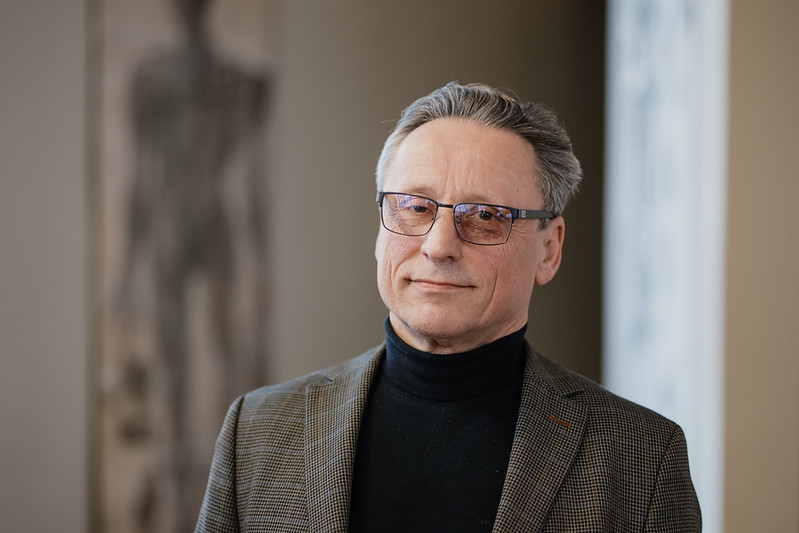Professor Gefenas: "Ethical Dilemmas Still Exist in Health Research"
 Regulations are in place all over the world to regulate the activities of scientists and help prevent unethical research. However, scientists still face ethical dilemmas, says Professor Eugenijus Gefenas of the Faculty of Medicine at Vilnius University in the latest episode of "VU Experts Help To Understand".
Regulations are in place all over the world to regulate the activities of scientists and help prevent unethical research. However, scientists still face ethical dilemmas, says Professor Eugenijus Gefenas of the Faculty of Medicine at Vilnius University in the latest episode of "VU Experts Help To Understand".
According to the professor, freedom of scientific activity is one of the most important principles of science. However, there are certain red lines in the work of scientists that should not be crossed.
The red lines were drawn in Europe after World War II. This was due to the Nazis' brutal experiments on humans without their consent and involving torture.
"This created a red line stating that you can't do an experiment on someone who hasn't given their informed consent. Even more so if the experiments lead to death or injury or physical risks," says the scientist.
"But it is only one level. The algorithms of modern scientific ethics research are made up of a number of principles that have to be navigated between," he adds.
The professor points out that ethical dilemmas are the result of an ambiguous situation in which two ethical principles collide.
"For example, we need to develop a cure very quickly, as we did with the vaccine against COVID-19. It was registered under an accelerated procedure to protect humanity from the virus.
On the other hand, we weighed the risk for individuals, the first ones among us to received the vaccines in the research phase. This brought benefits to society as a whole, while the risks were higher than with other vaccines, due to the shorter testing period. This is a dilemma, and we choose the lesser evil", says Professor Gefenas.
Strictly regulated activities
According to the professor, health researchers are very well familiar with the Declaration of Helsinki, a code of ethics that applies worldwide. UNESCO develops documents that involve countries around the world as well. In addition, the European Union institutions or the Council of Europe develop documents at European level, and the activities of researchers are regulated by national laws.
According to Professor Gefenas, differences in laws and regulations between countries are linked to sensitive issues such as research on early human embryos. In some countries it is allowed, in others it is not.
"Recent discoveries may be regulated differently in different countries. However, global guidelines would prevent practices where unsafe research is exported to another country. For example, developing a medicine in a country that has more resources, and the risk level of administering the medicine to a person for the first time is higher, the research would suddenly be transferred to one of third countries," says the scientist.
According to the professor, when Dolly the sheep was cloned in Scotland in the 1990s, it was discussed whether this could be applied to humans. But very quickly, international agreements emerged that prohibit this.
"There is another cloning scenario called therapeutic cloning, where the nucleus of a somatic cell is transferred into an egg, which could also be a human egg, in order to grow stem cells without growing a human being. The British have a rule that the embryo is grown until day 14, until which time stem cells would be harvested as therapeutic material to treat a patient", he said.
According to the scientist, research on embryos is not allowed in Lithuania. This is regulated by a law passed by Parliament. What a public opinion poll would show is another thing.
"These are worldview issues. I believe that opinion polls are very much needed as a basis for MPs and legislators. The two things are inseparable. The involvement of experts is, of course, essential. I think that working groups should include experts, who also usually have different world views," he says.
Dilemmas of today
According to the professor, ethical dilemmas still exist in health research. While the cloning debate has died down, the ethical issues surrounding genome editing are being discussed today.
"Genome editing in germ cells is controversial. Liberal countries allow genome editing as scientific research, but without ever going into what happened in China. There, embryos of twin girls were genetically edited with the idea that they would be resistant to HIV infection when born. Here, the research phase has already been crossed and clinical application has begun", he said.
According to the professor, there is a moratorium in many countries on clinical genome editing using germ cells leading to the birth of a human being. Chinese scientist He Jiankui has been subjected to very strict sanctions.
The latest series of "VU Experts Help to Understand" programmes, broadcast on the news portal LRT.lt, aims to dispel myths about science that are ingrained in society, and to talk about it in a simple, understandable way. Anyone can suggest topics for future episodes by asking a question in the sub-menu.
The series of programmes and articles "VU Experts Help To Understand" was launched in 2020 as Vilnius University's response to changes in society due to the coronavirus pandemic. The University's experts also helped to understand other issues of public interest, explaining in clear terms what the Nobel Prizes were awarded for.